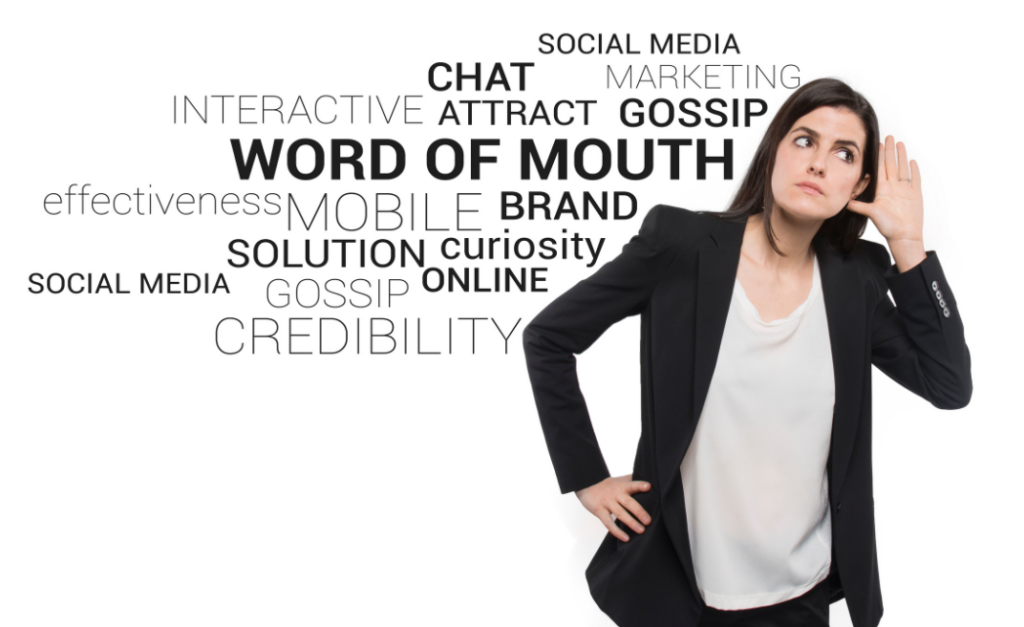
In a nutshell:
- What is whisper marketing?
1.1 Where did the whisper marketing phenomenon come from?
1.2 Types of whisper marketing
- How to use whisper marketing in business?
2.1 Tools for whisper marketing
- Summary
Co zrobić, aby było o nas głośno? Jak rozprzestrzenić swoją markę i stać się bardziej rozpoznawalnym? Jednym z najefektywniejszych sposobów jest marketing szeptany. Zastanawiasz się, czym jest i jakie ma rodzaje? Zastanawiasz się, jak wdrożyć go w swojej firmie i jakie narzędzia mogą Ci w tym pomóc? Wszystko to i więcej omówimy w niniejszym artykule.

What is whisper marketing?
Whisper marketing is also known as buzz marketing, word of mouth marketing and rumour marketing. It involves creating situations that prompt consumers to talk about the brand, leading to spontaneous sharing of opinions. Marketers foster these conversations, which makes brand information spread naturally, without resistance from customers.
Where did the whisper marketing phenomenon come from?
The phenomenon of whisper marketing came from the fact that it relies on a certain inherent need in all of us. As we know, where there is a need, there is marketing. Rumour is a quick way of spreading information because it engages emotions. News about a company spreads 'from mouth to mouth', which increases interest and leads to a snowball effect - the further the information is carried, the greater the reach it achieves. People often share their opinions during conversations without realising that in doing so they are simultaneously advertising a product. This is what whisper marketing is based on. This method is based on the need for confirmation, as no one wants to invest time and money in an unknown brand. This is why recommendations are so effective - people trust their friends' opinions more than they trust advertisements, which makes word-of-mouth marketing a valued method of promotion.
W skrócie, kluczowe czynniki wpływające na fenomen marketingu szeptanego to:
- Word-of-Mouth
Whisper marketing harnesses the power of 'word-of-mouth', the spread of information by people who have themselves used a product or service. This allows positive feedback to reach a large number of people quickly.
- Authenticity
Consumers trust recommendations from friends, family or others. When someone recommends a product or service, it is often perceived as a personal opinion, which increases trust in a brand. Whisper marketing relies on natural recommendations and opinions, which are seen as more credible than traditional forms of advertising.
- Low costs
Compared to traditional advertising campaigns, whisper marketing can be much cheaper. It does not require a large investment in media or promotional materials.
- Personalisation
Whisper marketing can target specific audiences in a more precise and personalised way.
- New technologies
As new technologies and social media platforms evolve, whisper marketing is adapting to these changes, making it possible to reach new audiences in a modern way.
- Relationship building
Customers who engage in whisper marketing often feel more connected to the brand. As a result, they are more likely to share positive experiences and recommend the product to others.
Research shows that 90% consumers are guided by the opinions of others when choosing products, while only 14% pay attention to traditional advertising, highlighting the effectiveness of whisper marketing in building brand recognition and a positive image.
Types of whisper marketing
Whisper marketing can be divided into two main types: organic i amplified.
Organic marketing is the form that occurs when customers, being satisfied with a product or service, start sharing their positive experiences themselves.
Amplified marketing involves deliberate efforts by companies to encourage the spread of information about their products or services. It can include a variety of initiatives, such as sending out products for review, organising testimonial programmes or planning events to promote the brand.
How to use whisper marketing in business?
The following strategies are closely related to whisper marketing:
- Viral marketing
It involves creating content (e.g. memes, gifs) that is interesting or funny enough that users are willing to share it. They should be related to the product/service and have no advertising qualities.
- Influencer marketing
It uses popular people on social media who share their positive experiences with the company's products, influencing their followers.
- Reference programmes
Reward customers for recommending products or services to others by offering discounts or rewards.
- Cause marketing
Involves the brand in charitable or social activities while promoting its image by supporting important social values and causes.
- Evangelist marketing
It involves engaging loyal customers who enthusiastically share their experiences with the brand, becoming its 'ambassadors'.
- Community marketing
It focuses on building a community around the brand, where interaction between brand members fosters the dissemination of information. It involves following discussions and subtly weaving information into forums and online groups.
Tools for whisper marketing
Whisper marketing is becoming increasingly popular, especially online, in discussion forums, blog comment sections and social media. To effectively manage a whisper marketing campaign and monitor its effects, it is worth using dedicated tools such as:
- BuzzSumo
BuzzSumo makes it easy to find influencers who can support our marketing campaign. The tool also focuses on creating engaging content and helps identify current trends and topics that are attracting user attention on social media.
- Mediatoolkit
This tool allows you to keep up to date with all mentions of your company online. With instant updates, Mediatoolkit allows you to quickly monitor brand publications and discussions.

Summary
Marketing szeptany jest skuteczny dla każdego rodzaju biznesu, ponieważ bazuje na ludzkich emocjach i zaufaniu. Jego główną zaletą jest niski koszt, a efektywność można monitorować i utrzymywać dzięki dedykowanym narzędziom.
If you need support in this or other areas of marketing, it is worth consulting an interactive agency.

 4 minutes reading
4 minutes reading


